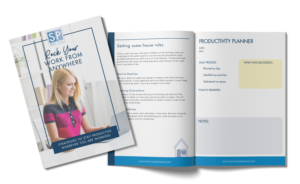
Does this ever happen to you? You reach the end of your day and realize that half the things on your to-do list for the day were not completed (maybe some were not even started) so now your list of what you need to do tomorrow is even longer. If this is a familiar scenario, you are not alone! Accurately estimating how long tasks will take, prioritizing, and managing time to accomplish everything you need to do can be challenging even for people who are generally well organized. Rather than wishing for more hours in the day (or sacrificing sleep or other important self care practices) you may need a better way to manage your time so that you can complete what you must get done and still have some time for the additional things you would like to do.
Just like any other skill or new habit, time management skills require intention, effort and practice to master. It takes a commitment and consistent use to develop new time management skills and see the benefits. There are some relatively small changes that you can make now to improve the way you manage your time which will increase your productivity and give you more peace at the end of the day. Following are six tips for developing good time management skills.
6 Tips for Time Management Success
1. Plan and prioritize
As with any other type of goal, creating a plan will help you reach it. The first step to managing your time is getting clear about what needs to be done. Prioritizing helps ensure the tasks that absolutely must get done are at the top of the list. Planning and prioritizing should be done both daily as well as weekly, monthly and at longer intervals such as quartlery and annually. Schedule time at the end of each day to review what you accomplished and plan what you are going to do tomorrow so you are ready to go the following morning. Doing the same thing at the end of each week helps you be well prepared to start the following week with an organized plan and list of relevant priorities and tasks.
2. Cross it off the list
The best way to keep track of the things you need to do is with a written list that is always available easy to update. Maintaining one (and only one!) system for your list is smartest – choose one reliable method and place to collect and track your tasks, so you will always know where to look. Whether you write your list in a notebook, daily planner, software like Outlook (the tasks feature is a handy tool that we use and teach others how to optimize) or use one of the many online tools available, make a list and stick to it. Even if you have multiple types of task categories (such as business and personal) it is still best to keep all tasks in the same system; you can use color coding or other ways of categorizing task types. The key is to not have to search in several places (different software programs or notebooks for example) for multiple task lists, which leads to disorganization and ineffeciency.
2. Set deadlines
Once you have thought through your tasks and and decided what needs to be done, set deadlines for when each task needs to be completed. Work on setting goals and deadlines for tasks on your list for the week, month, quarter and year, and schedule time to regularly review your goals since priorities can change which may require adjusting deadlines.
3. Prevent procrastination
Procrastination is one of the most obvious time management enemies and productivity killers. Putting off until later what can be done now is a sure way to get behind in your day. We usually put off the things we dislike the most, making them even more difficult to do after we are tired from our day. Get those dreaded chores done early, and enjoy the satisfaction of checking them off your list!
4. Measure twice, cut once
The old adage for woodworking works in life too. Take your time to do your tasks right the first time. Rushing through will only end up costing you more time when you end up having to fix mistakes or redo things to get them right.
5. Delegate
You are the manager of your time, and as any good manager knows, delegating is an important key to success. Your time is valuable, and sometimes it is better to let someone else take over some of your tasks versus not getting them done at all. Always ask yourself, especially when you are feeling overwhelmed, if there are responsibilities or duties you can ask someone else on your team to do, or other tasks that would be better to outsource.
6. Say no
Often we (and others) ask too much of ourselves, and before we realize it our plates are overloaded and overwhelm takes over. Sometimes we need to say no in order to stay on task and keep up with all we have to get done throughout the day. It can be hard to say no when someone asks you if you can plan the next fundraiser or take on another project at work, but sometimes you must. Consider what you already have on your plate before adding more to it. Saying no is easiest when we have a clear vision of our goals and planned priorities. When you are asked to take on something new, first ask yourself if the new project or task is in alignment with the priorities you have established.
Help Is Available!
Developing excellent time management skills takes effort and may require changing several old habits, but the benefits are well worth the effort. By learning ways to better manage your time, you can experience less stress, be more productive, and have more time to relax and enjoy the satisfaction that comes with knowing you crossed everything off your list for the day and nothing is slipping through the cracks.
Optimizing time management is one of the foundational building blocks of our productivity consulting and training programs. In our “Cross It Off The List” workshop we teach participants how to discern the difference between values, goals, projects and tasks, and strategies for developing productive habits to effectively prioritize tasks, manage time and get the right work done at the right time.
Contact us today to learn more about how we can help you or your employees improve time management, delegation, focus and many other common productivity challenges, so that you enjoy the benefits of working smarter not harder.






